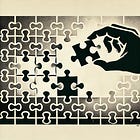You Are Not the Sum of Your Parts
How perspective can isolate us and create the space for freedom.
When I was a kid there was a toy I loved, a kaleidoscope, where you looked in one end and by turning the other end, sifted grains of multi-colored sand to make different patterns. You couldn't add any new grains, you couldn't change the colors. The only thing you could do was change the speed with which you turned the one end. I was struck by the nearly infinite variation that could be created, despite there being a finite number of grains being moved around.
Given the human predilection for simplicity and the fact that perspective always has to start from a fixed point, we have a tendency to attempt isolating one or another facet of experience in such a way as to make it the whole. Functionally, this is the neurological basis for bias or cognitive heuristics, where the various forms that bias takes are concerned with narrowing perspective to a manageable or singular direction. Unfortunately, this simplicity tricks us, as so often it is accompanied by a lack of self-reflective criticism, that said singular perspective, as if a single grain or color in a kaleidoscope, makes us capable of seeing the entire image. In fact, quite often we’ll go even further in fundamentalist religious and political ideologies, that a single perspective not only provides the entire image, but every potential image.
Self-Reflection Needs Criticism
When was the last time you felt shame? Doubt? Self-criticism? Do you remember what it was about? Perhaps you do. New question. Do you remember what it wasn't about? That last question may be rather jarring. Let's put it another way: what are you not thinking about right now? Hmm.... right, likely even more confusing. Let's try something different. Pick an object, any object, around you and stare at it. Now, without looking away, describe what's behind you. Obviously there are shortcomings to this as you may be in a familiar place, but I hope the point is made. There is an entire reality living, breathing, existing outside of your momentary perception, both in sight and in mind.
A singular focus or perspective isolation not only creates a lie of wholeness that doesn’t exist, but it leads to a dismissal of life’s possibilities and even existence. This may, at first thought, seem like it doesn’t matter much. Consider, however, the last time you stubbed a toe, or yelled at your dog for attempting to cross the street right in front of a car, or got surprised by an object seeming to suddenly ‘leap’ out of nowhere. Just because focal isolation is an inevitable part of our biological interaction within reality, doesn’t make it something we should accept without question. A great deal of human progress is identifying what is, to then embark on various attempts at changing it to something else.
Admittedly, to have our focus be easily swayed by every whim of thought or movement in nature would have really put a damper on our survival potential as a species. Were we the proverbial dog gallivanting after every 'squirrel,' we'd have walked off a cliff, got eaten by an animal or missed out on catching our food. In other words, we'd have died. To survive we needed the capacity to focus, to isolate our conscious appraisal. This came with the parallel ability to ignore everything else.
So next time someone points out that you were ignoring them, just blame your biology. I'm kidding. Really. Don’t do that.
A Perspective Reminder
Let's come back to the shame and criticism piece. Or, if you'd like, the self-congratulatory and joyful piece. It really doesn't matter, because you can participate in the focus/ignore process with any of the above and more. Within ACT (Acceptance and Commitment Therapy), this process of isolating conscious appraisal to a single thing is called fusion. One of the many difficulties with fusion is that the whole of who you are and the surrounding extent of reality gets removed from consideration. We lose the ability to flexibly respond to situations, both internal and external, and that static form of living contributes to a whole host of problems, many of which we designate with mental health pathology labels.
Depression? A focus on self-doubt and criticism while ignoring the vast majority of time you've lived without failure. Anxiety? A focus on what has or could go wrong, ignoring the vast majority of events that were either neutral or went correctly. Relationship difficulty? A focus on what she/he did wrong, ignoring the majority of behavior that was loving or neutral (as a strong caveat, this is not about when abuse is occurring and if such is happening please reach out for help).
Step outside the typical mental health therapy categories for a moment. Ever considered yourself incapable because of some part of who you are, like your sex, your family background, a personal experience you had, or some other part of yourself? These are all parts to be utilized by fusion to create a false whole of who you are in the present, who you may have been in the past, and who you are capable of being in the future.
Notice in the image above that as you focus on a trait, characteristic, event or identity, the 'self' gets more and more left behind. Further, the other parts do as well! Our existence resides not only at the intersection of all these variables, but we can shift perspective to an instantiation of any of them at a given moment. Freedom isn’t found in getting rid of what inspires perspective, or in isolating one to the expulsion of all else, it is found when we consider more carefully what we're doing when we think create the narratives guiding the behavior supporting our Values.
This takes practice. Sometimes said practice can be silly, and other times fun. Have you ever pondered what it would be like to live life as if operating centrally from the big toe on your left foot? What would it be like, what would be lost or made hyper aware of, if you introduced yourself always and forever by reciting a story of your birth? Or, less potentially weighted by social pressure, what if you started every story of your life with a recitation of the breakfast you had on the second Tuesday of October a few years ago? Sound ridiculous? Of course it is. And yet we do this very thing all the time, getting trapped in the boxes of our own creation, and imagine that just because we find it meaningful (forgetting that it is we who provided that weight of meaning in the first place) that it is a legitimately healthy thing to do.
Practice Perspective Expansion
As with anything healthy and contributing to psychological flexibility, stepping away from fusion and into freedom takes practice.
You can begin with the simple acknowledgment: "I am more than any single thought, feeling or behavior."
As soon as shame, self-doubt and criticism occur, or we get wrapped up in defining our lives through a single event, we can start to learn to reflect on what is being hidden by those limitations. Here are three skills to practice:
Ask yourself: What am I not noticing? The question may seem counter-intuitive, but that jarring feeling may get you outside of the rut you find yourself in.
Change focus: bring your attention to physical sensation (also called ‘grounding’), like the feel of your clothes against your skin; or to an object in your immediate experience, noting as many characteristics as you can; or if you're stuck in a memory, deliberately and imaginatively place yourself as an observer instead of a participant, as if looking through a window on the event itself.
Shift perspective: pursue a different story, like the old choose your own adventure novels; imagine how someone from a different socio-cultural background would think; or deliberately change the thought/feeling by singing it or mimicking it as the voice of your favorite actor or fictional character.
Who you are is more than the sum of your parts. There is no such thing as a necessary and inevitable outcome from any single event, personal characteristic, trait, or identity. These things do not come with an instructional manual that says “connect X and only X with Y.”
Consider that what we considered life-ending as children, we can usually laugh at now, and what we considered truth we can now ruefully shake our heads at the naivety and ignorance. Our thoughts about love and hate have gone through many evolutions as our lives have unfolded. Our smiles have gotten deeper. Our concerns have gotten broader. What we consider important has changed. This is all for the good, because the world is a lot bigger than any one of us and that means there's always room to grow.




